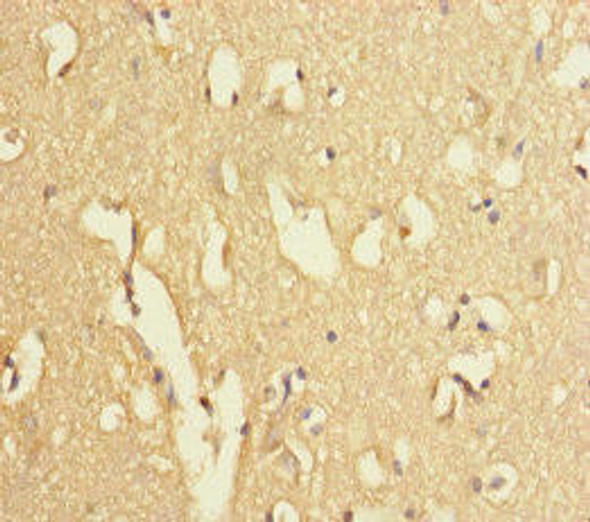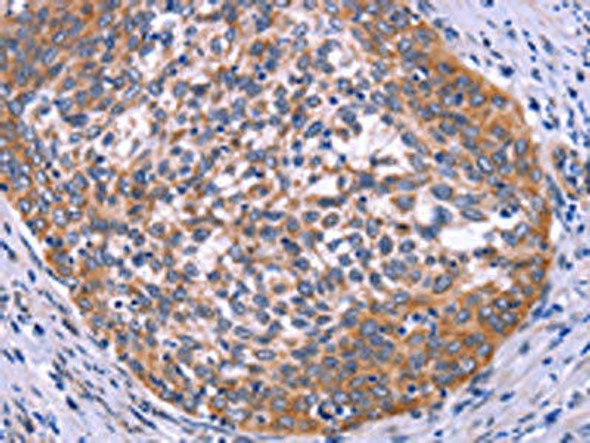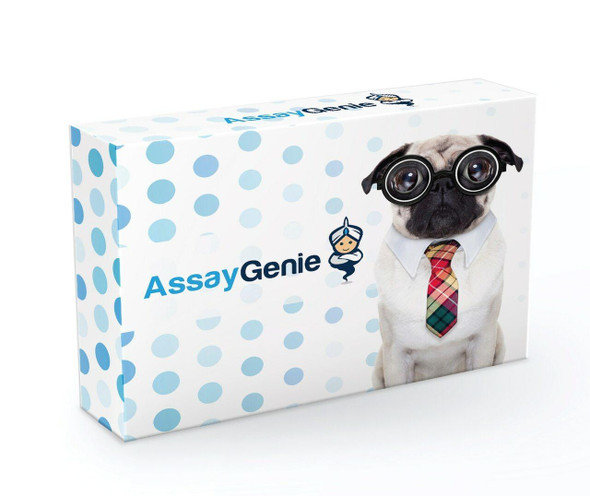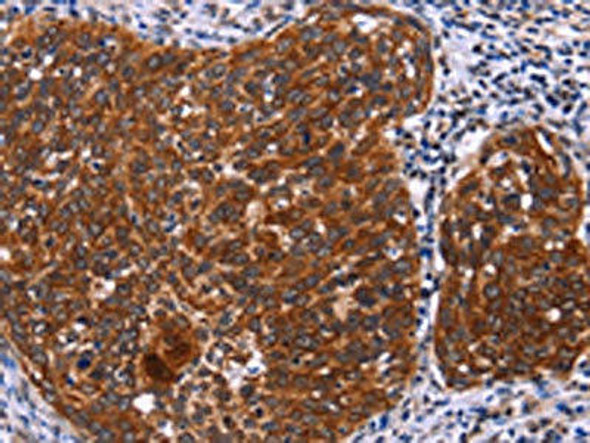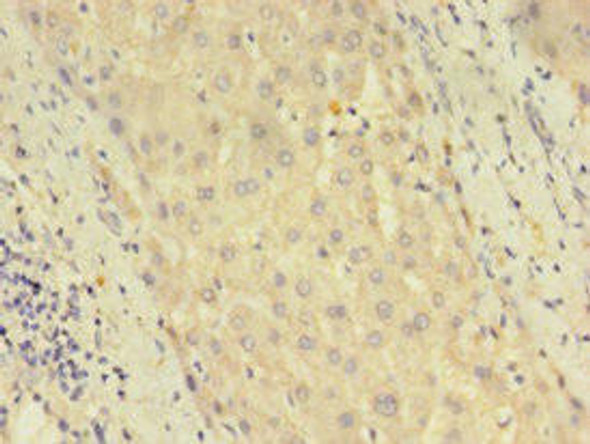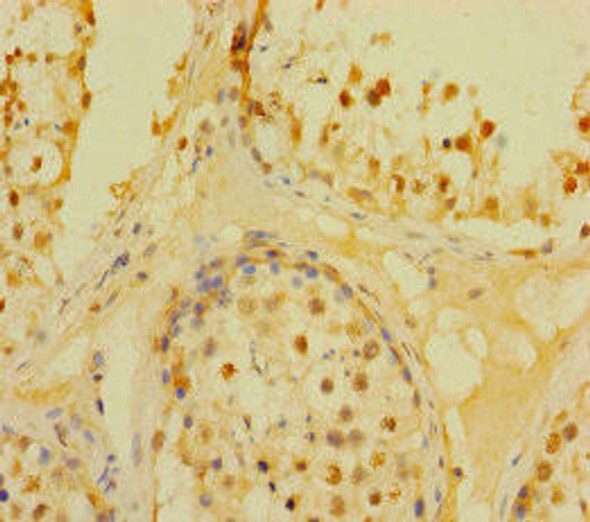Description
USP2 Antibody (PACO46314)
The USP2 Polyclonal Antibody (PAC046314) is a valuable tool for researchers studying USP2, a deubiquitinating enzyme with various functions in cellular processes. This antibody, produced in rabbits, exhibits high specificity and sensitivity towards human samples, making it an excellent choice for Western blot applications. By targeting the USP2 protein, this antibody facilitates the detection and analysis of USP2 levels in diverse cell types, enabling comprehensive investigations in fields such as cell biology and cancer research.USP2 is known for its role in regulating protein stability and degradation through the removal of ubiquitin molecules from target proteins.
As a key player in the ubiquitin-proteasome system, USP2 is implicated in diverse physiological and pathological processes, including cell cycle regulation, DNA repair, and tumorigenesis. By elucidating the mechanisms of USP2 function, researchers can gain insights into potential therapeutic targets for diseases such as cancer and neurodegenerative disorders, paving the way for the development of novel treatment strategies.
| Antibody Name: | USP2 Antibody (PACO46314) |
| Antibody SKU: | PACO46314 |
| Size: | 50ug |
| Host Species: | Rabbit |
| Tested Applications: | ELISA, IF |
| Recommended Dilutions: | ELISA:1:2000-1:10000, IF:1:50-1:200 |
| Species Reactivity: | Human |
| Immunogen: | Recombinant Human Ubiquitin carboxyl-terminal hydrolase 2 protein (9-265AA) |
| Form: | Liquid |
| Storage Buffer: | Preservative: 0.03% Proclin 300 Constituents: 50% Glycerol, 0.01M PBS, PH 7.4 |
| Purification Method: | >95%, Protein G purified |
| Clonality: | Polyclonal |
| Isotype: | IgG |
| Conjugate: | Non-conjugated |
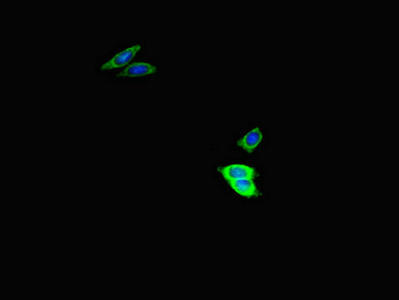 | Immunofluorescent analysis of HepG2 cells using PACO46314 at dilution of 1:100 and Alexa Fluor 488-congugated AffiniPure Goat Anti-Rabbit IgG(H+L). |
| Background: | Hydrolase that deubiquitinates polyubiquitinated target proteins such as MDM2, MDM4 and CCND1. Isoform 1 and isoform 4 possess both ubiquitin-specific peptidase and isopeptidase activities. Deubiquitinates MDM2 without reversing MDM2-mediated p53/TP53 ubiquitination and thus indirectly promotes p53/TP53 degradation and limits p53 activity. Has no deubiquitinase activity against p53/TP53. Prevents MDM2-mediated degradation of MDM4. Plays a role in the G1/S cell-cycle progression in normal and cancer cells. Plays a role in the regulation of myogenic differentiation of embryonic muscle cells. Regulates the circadian clock by modulating its intrinsic circadian rhythm and its capacity to respond to external cues. Associates with clock proteins and deubiquitinates core clock component PER1 but does not affect its overall stability. Regulates the nucleocytoplasmic shuttling and nuclear retention of PER1 and its repressive role on the clock transcription factors CLOCK and ARNTL/BMAL1 (By similarity). |
| Synonyms: | Ubiquitin carboxyl-terminal hydrolase 2 (EC 3.4.19.12) (41 kDa ubiquitin-specific protease) (Deubiquitinating enzyme 2) (Ubiquitin thioesterase 2) (Ubiquitin-specific-processing protease 2), USP2, UBP41 |
| UniProt Protein Function: | USP2: Hydrolase that deubiquitinates polyubiquitinated target proteins such as MDM2, MDM4 and CCND1. Isoform 1 and isoform 4 possess both ubiquitin-specific peptidase and isopeptidase activities. Deubiquitinates MDM2 without reversing MDM2-mediated p53/TP53 ubiquitination and thus indirectly promotes p53/TP53 degradation and limits p53 activity. Has no deubiquitinase activity against p53/TP53. Prevents MDM2-mediated degradation of MDM4. Plays a role in the G1/S cell-cycle progression in normal and cancer cells. Plays a role in the regulation of myogenic differentiation of embryonic muscle cells. Homooligomer. Found in trimeric complex with MDM2 and MDM4 and UPB2. Interacts with CCND1; the interaction is direct and promotes its stabilization by antagonizing ubiquitin-dependent degradation. Interacts (via N-terminus and C- terminus) with MDM2. Interacts with MDM4. Down-regulated by cisplatin. Expressed in mesangial cells of the kidney and in different types of glomerulonephritides. Cleavage is inhibited by ubiquitin in a dosage- dependent manner. Cleavage is blocked by ubiquitin aldehyde. Belongs to the peptidase C19 family. USP2 subfamily. 4 isoforms of the human protein are produced by alternative splicing. |
| UniProt Protein Details: | Protein type:Ubiquitin-specific protease; Protease; EC 3.4.19.12 Chromosomal Location of Human Ortholog: 11q23.3 Cellular Component: centrosome; perinuclear region of cytoplasm; cytoplasm; cell cortex; nucleus Molecular Function:identical protein binding; protein binding; cyclin binding; ubiquitin protein ligase binding; metal ion binding; cysteine-type endopeptidase activity; ubiquitin-specific protease activity Biological Process: proteasomal ubiquitin-dependent protein catabolic process; negative regulation of skeletal muscle development; muscle development; protein deubiquitination; protein stabilization; positive regulation of skeletal muscle development; negative regulation of transcription from RNA polymerase II promoter; positive regulation of mitotic cell cycle; cell cycle; circadian behavior; entrainment of circadian clock by photoperiod; locomotor rhythm; circadian regulation of gene expression |
| NCBI Summary: | This gene encodes a member of the family of de-ubiquitinating enzymes, which belongs to the peptidase C19 superfamily. The encoded protein is a ubiquitin-specific protease which is required for TNF-alpha (tumor necrosis factor alpha) -induced NF-kB (nuclear factor kB) signaling. This protein deubiquitinates polyubiquitinated target proteins such as fatty acid synthase, murine double minute 2 (MDM2), MDM4/MDMX and cyclin D1. MDM2 and MDM4 are negative regulators of the p53 tumor suppressor and cyclin D1 is required for cell cycle G1/S transition. Multiple alternatively spliced transcript variants encoding different isoforms have been identified. [provided by RefSeq, Aug 2011] |
| UniProt Code: | O75604 |
| NCBI GenInfo Identifier: | 20141855 |
| NCBI Gene ID: | 9099 |
| NCBI Accession: | O75604.2 |
| UniProt Secondary Accession: | O75604,Q8IUM2, Q8IW04, Q96MB9, Q9BQ21, B0YJB8, E9PPM2 |
| UniProt Related Accession: | O75604 |
| Molecular Weight: | 605 |
| NCBI Full Name: | Ubiquitin carboxyl-terminal hydrolase 2 |
| NCBI Synonym Full Names: | ubiquitin specific peptidase 2 |
| NCBI Official Symbol: | USP2 |
| NCBI Official Synonym Symbols: | USP9; UBP41 |
| NCBI Protein Information: | ubiquitin carboxyl-terminal hydrolase 2; ubiquitin thioesterase 2; deubiquitinating enzyme 2; ubiquitin specific protease 9; ubiquitin specific protease 12; 41 kDa ubiquitin-specific protease; ubiquitin-specific-processing protease 2 |
| UniProt Protein Name: | Ubiquitin carboxyl-terminal hydrolase 2 |
| UniProt Synonym Protein Names: | 41 kDa ubiquitin-specific protease; Deubiquitinating enzyme 2; Ubiquitin thioesterase 2; Ubiquitin-specific-processing protease 2 |
| Protein Family: | Protein |
| UniProt Gene Name: | USP2 |
| UniProt Entry Name: | UBP2_HUMAN |


